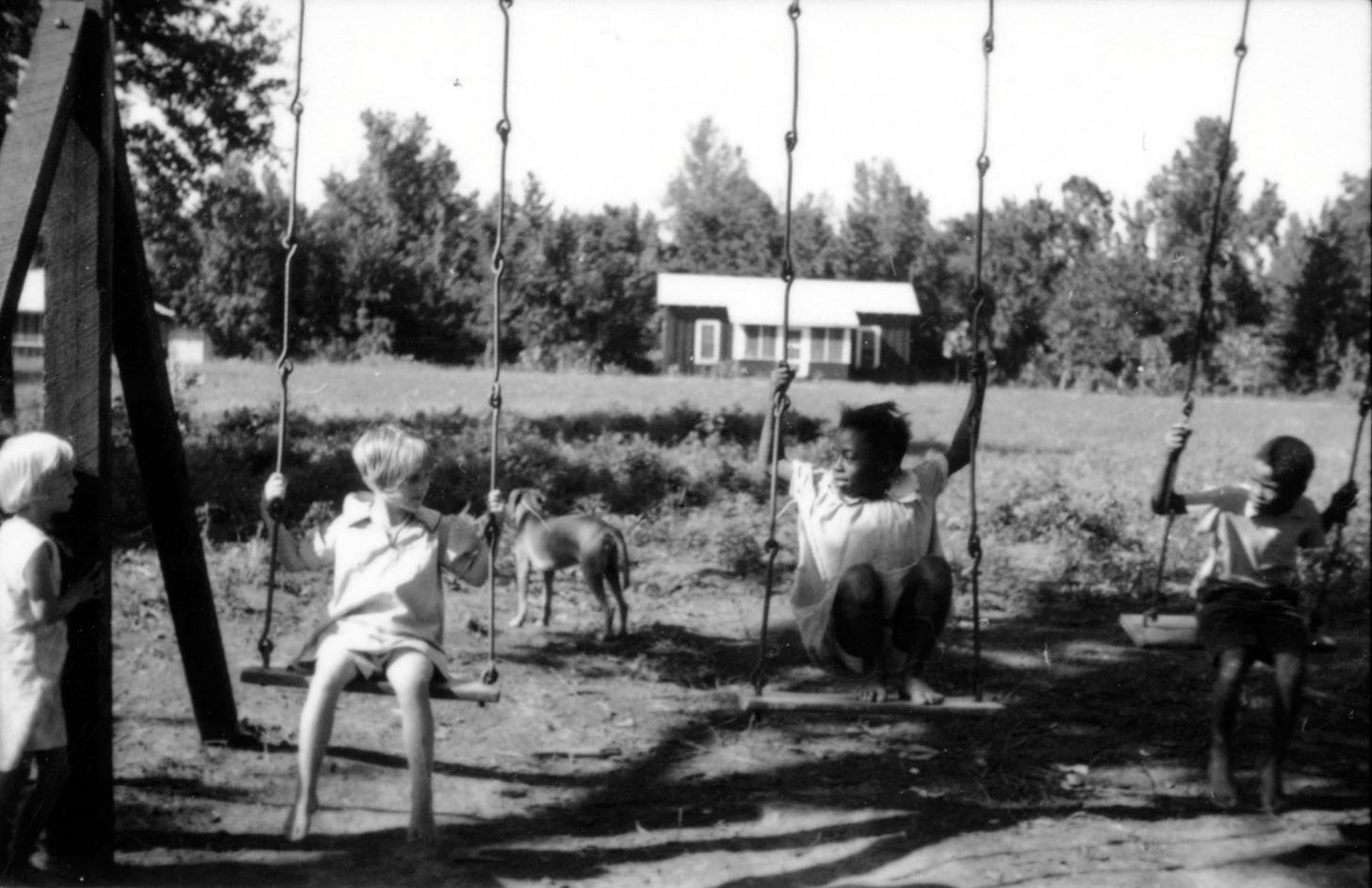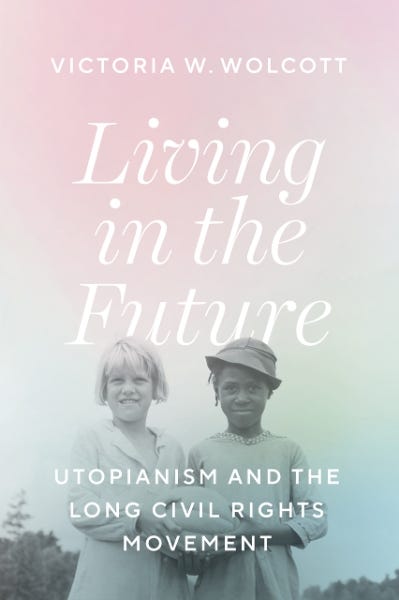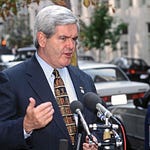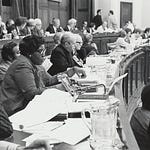
In the last episode, we discussed the aspirations and limitations of the 19th-century Black freedom movement; this week, Black and white Progressives imagine a twentieth century without racism. My guest is Victoria W. Wolcott, professor of history at the State University of New York at Buffalo and author of Living in the Future: Utopianism and the Long Civil Rights Movement (University of Chicago Press, 2022). In this new take on twentieth-century interracialism, Wolcott recreates a world of prefigurative politics that would set the stage for the social movements of the post-war era—not just the Black civil rights struggle but all the liberation movements that arose from and alongside it.
Program notes:
The Freedom Singers’ performance of "We Shall Not Be Moved" was recorded at the March on Washington for Jobs and Freedom in Washington D.C. on August 28, 1963, and appears courtesy of the United States National Archives and Records Administration. You can listen to the whole song here.
You can learn more about prefigurative politics in Carl Boggs, Jr.,
“Marxism, Prefigurative Communism, and the Problem of Workers' Control,” Radical America 11 (November 1977) and “Revolutionary Process, Political Strategy, and the Dilemma of Power,” Theory & Society no. 4, No. 3 (Fall); and D.K. Leach, “Prefigurative politics,” Encyclopedia of Social and Political Movements (Wiley-Blackwell, 2013).
As Claire and Victoria discuss, utopianism has a long history in the United States: read about the philosophy’s links to racial justice in Greg Carter, The United States of the United Races: A Utopian History of Racial Mixing (NYU Press, 2013). For major figures discussed in the show, see Douglas F. Dowd, "Robert Owen, "Encyclopedia Britannica Online, Richard Gunderman "Robert Owen, born 250 years ago, tried to use his wealth to perfect humanity in a radically equal society," New Haven Register, May 11, 2021, and Jonathan Beecher and Richard Bienvenu, Eds., The Utopian Vision of Charles Fourier: Selected Texts on Work, Love and Passionate Attraction, (Beacon Press, 1971).
For more on the Black cooperative movement, see Irvin J. Hunt, Dreaming the Present: Time, Aesthetics, and the Black Cooperative Movement (University of North Carolina Press, 2022) and Jerry W Dallas, “The Delta and Providence Farms: A Mississippi Experiment in Cooperative Farming and Racial Cooperation, 1936-1956,” Mississippi Quarterly v. 4 (1987).
Living in the Future adds to the history of the “long” civil rights movement: Claire mentioned Jacquelyn Dowd Hall’s prize-winning article, "The Long Civil Rights Movement and the Political Uses of the Past," The Journal of American History, v. 91, no. 4 (2005). Claire also mentioned Hall’s most recent book about race and feminism in the south, Sisters and Rebels: A Struggle for the Soul of America (W.W. Norton & Company, 2019).
Victoria also discusses the importance of Pauli Murray to the long civil rights movement. You can read more about Murray in Rosalind Rosenberg’s Jane Crow: The Life of Pauli Murray (Oxford, 2017).
A primary source that would help you explore the Brookwood project is a book published by the American Federation of Teachers, Local 189, The Place of Workers' Education in the Labor Movement: Fifth Annual Conference of Teachers in Workers' Education at Brookwood, February 24-26, 1928 (Brookwood, 1928).
Claire and Victoria focused in on the chapter about Father Divine and his movement. You might want to check out Jill Watts, God, Harlem U.S.A.: The Father Divine Story (University of California Press, 1992). In this section, Victoria also mentions Lizabeth Cohen, A Consumers' Republic: The Politics of Mass Consumption in Postwar America (Vintage, 2003).
Noting the radicalism of the pre-war movement for racial justice, Victoria mentioned Glenda Gilmore, Defying Dixie: The Radical Roots of Civil Rights, 1919-1950 (W.W. Norton, 2008) and Robin Kelley, Hammer and Hoe: Alabama Communists during the Great Depression (University of North Carolina Press, 1990).
You can read Victoria’s article about Floria Pinkney, "Networks of Resistance: Floria Pinkney and Labor Interracialism in Interwar America." The Journal of African American History v. 105, no. 4 (2020).
You can listen to this podcast by downloading it here or subscribe for free on Apple iTunes, Spotify, Google Podcasts, or Soundcloud. Do you use another service? Let me know in the comments, and I will submit it there as well! And if you know someone who would enjoy this podcast, please:
Short takes:
Abortion was on the ballot in five states—and abortion won! Makes me wish they had let us vote on it years ago. As Melissa Quinn writes at CBS News, “Buoyed by the defeat in Kansas of a proposed constitutional amendment removing the right to an abortion from the state constitution, other state lawmakers and activists are already laying the groundwork for ballot initiatives in more states in 2024.” (November 9, 2022)
Donald Trump was the biggest loser on the night of November 8, writes Alex Shepherd at The New Republic. “But Republicans also have a dilemma,” Shepherd continues. “There does seem to be a Trump effect in elections: When Trump is on the ballot, turnout is gigantic—for both parties. When he isn’t, Republicans suffer. If Trump were to somehow lose the Republican nomination in 2024, it’s highly likely he would claim fraud—or encourage his voters to stay home.” (November 9, 2022)
And who won the midterms? Florida Governor Ron DeSantis, says political guru David Frum at The Atlantic. But “If DeSantis is in the game now, he has to play now,” Frum warns, and stop ignoring the chief barrier between him and the GOP nomination in 2024. “Somebody who seeks to replace Trump atop the Republican Party cannot pretend Trump is not there. Trump is a huge personality who makes every contest a battle of personalities. Refusing to engage is not an option because he will engage whether his target likes it or not. There’s no choice except to engage in turn.” (November 9, 2022)
















Share this post